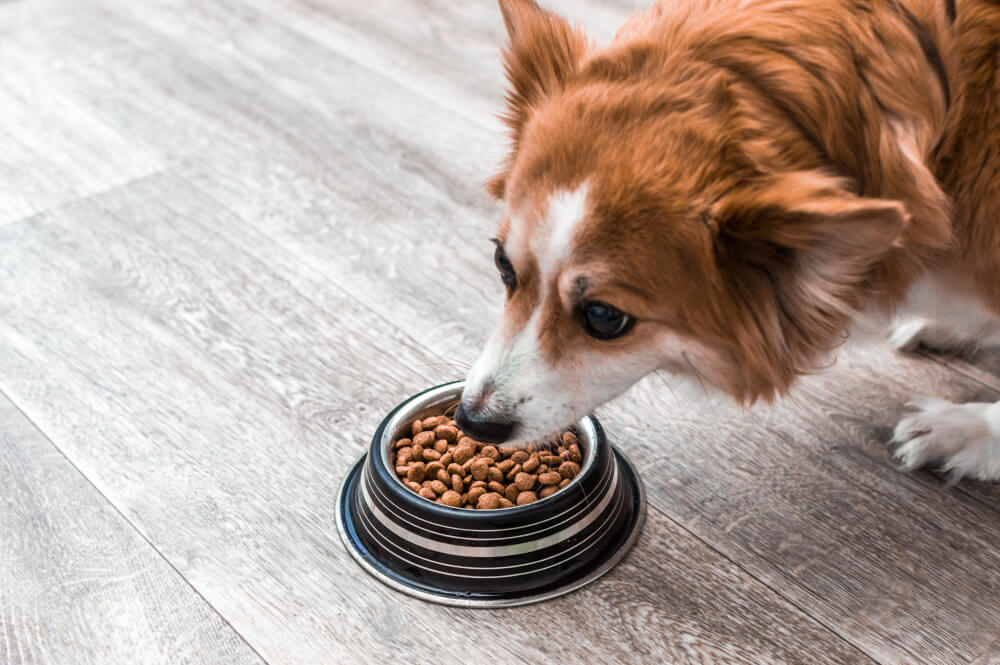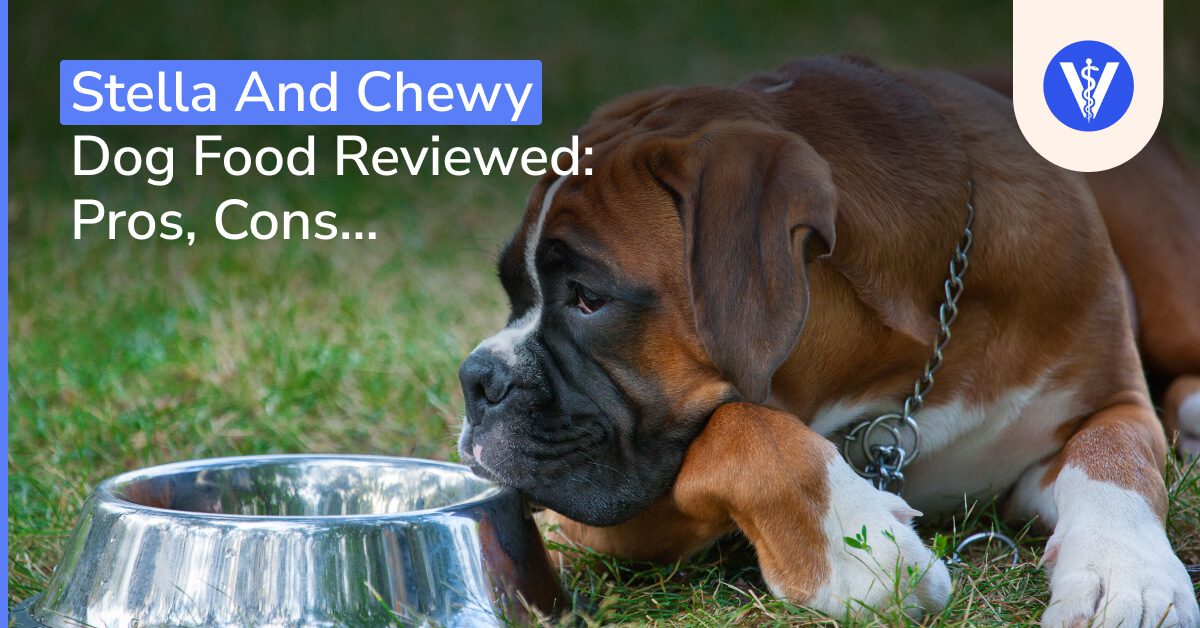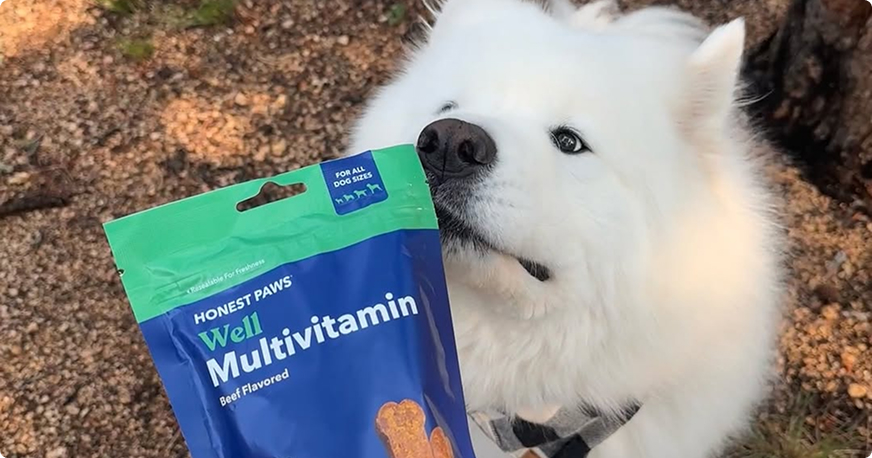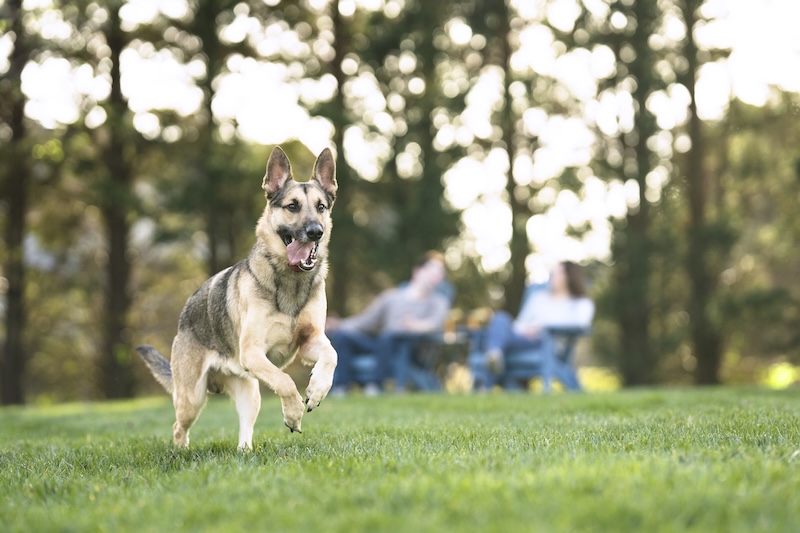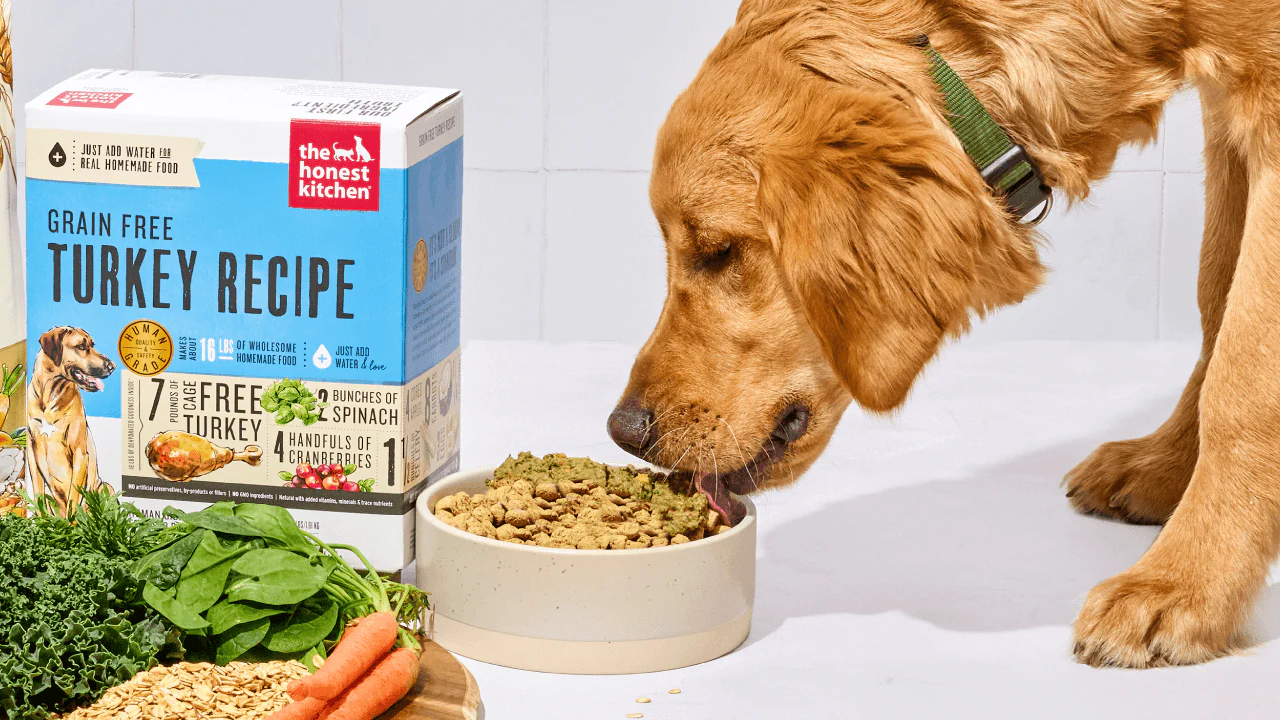Can Dogs Eat Chicken Bones?
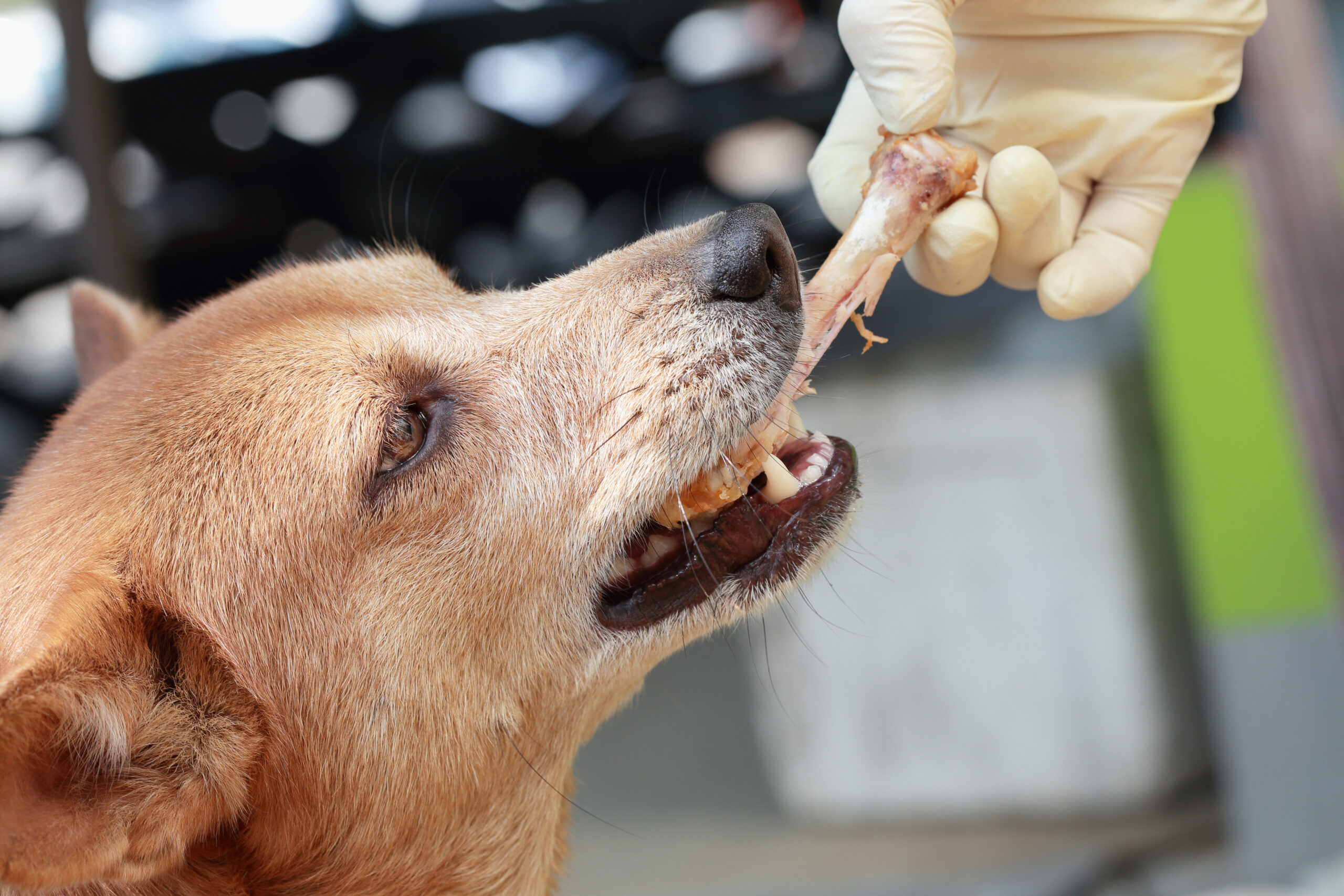

Can Dogs Eat Chicken Bones?
Table of Contents
Chicken bones for dogs are dangerous because they are brittle and can easily splinter, posing serious health risks whether they’re cooked or raw. A dog eating chicken bones might suffer from choking, mouth or throat injuries, or life-threatening internal blockages or tears. Creating a dog’s menu is a responsible task. Dogs thrive on nutritionally balanced diets rich in lean proteins. Chicken meat is an excellent source of protein, and it is best served cooked and plain.
The bones, however, must be removed before serving the meat. Chicken bones for dogs are not safe in any form or situation. Even if the dog passes the bones uneventfully, there is still a risk that they may cause allergies. Chicken is a frequent allergen in dogs.
A dog eating chicken bones is a serious situation that warrants veterinary attention. Call a vet if your dog ate chicken bones and follow their instructions carefully.
Why are Chicken Bones Bad for Dogs?
Chicken bones are bad for dogs because they are extremely brittle and prone to splintering. When a dog eats chicken bones, sharp splinters can break off and pose serious risks. These splinters are a choking hazard and can injure the mouth, throat, or become lodged in the esophagus. Once swallowed, bone fragments may damage the lining of the digestive tract, leading to painful perforations or even life-threatening infections like peritonitis.
Chicken bones can also cause dangerous blockages in the digestive tract. According to a 2022 study published in the Journal of Veterinary Internal Medicine, “Bone is the most commonly reported esophageal foreign body in dogs, accounting for 30% to 80% of reported cases.”
Cooked chicken bones are particularly risky because they splinter more easily. Raw chicken bones are somewhat tougher, but they carry additional dangers as they’re often contaminated with harmful pathogens such as Salmonella bacteria, which can cause severe infections in dogs and humans alike. Eating chicken bones can also upset a dog’s stomach, especially if the dog isn’t accustomed to eating this type of food or has eaten too much at once. Additionally, chicken is a known allergen for some dogs, so consuming chicken bones, or any chicken products, can provoke allergic reactions in sensitive pets. In conclusion, chicken bones for dogs are dangerous in any form. If you suspect your dog has eaten chicken bones, contact your veterinarian immediately for guidance.
When Are Chicken Bones Good for Dogs?
Chicken bones are never good for dogs. Although there are some theoretical benefits associated with chicken bones, in practice, the risks far outweigh any potential perks.
For example, the act of gnawing on bones or an object has both physical and mental benefits tied to it. It can release endorphins, which help boost a dog’s mental health. As a physical activity, chewing also keeps the jaw strong. The grinding motion of bones can mechanically scrape debris from the surface of the teeth, helping to keep them clean. Additionally, bones contain significant amounts of highly bioavailable calcium, phosphorus, and magnesium, and they’re rich in joint-friendly nutrients like glucosamine and chondroitin. Chicken bone marrow is also packed with B vitamins, certain minerals such as iron, and joint-supportive compounds like collagen.
Despite these theoretical benefits, it is strongly recommended not to feed chicken bones to dogs. The dangers of choking, splintering, internal injuries, and bacterial contamination make chicken bones unsafe for canine consumption in any form.
Can Dogs Eat Chicken Wing Bones?
No, dogs cannot eat chicken wing bones. Chicken wing bones are small, brittle, and prone to splintering into sharp fragments. These pieces can become lodged in a dog’s throat or esophagus, cause choking, or puncture the delicate lining of the digestive tract, leading to severe internal injuries. Whether raw or cooked, chicken wing bones for dogs are simply not safe. If your dog ate chicken wing bones, contact a veterinarian right away and carefully watch for signs of distress such as coughing, gagging, vomiting, or abdominal pain. Prompt veterinary attention can prevent a minor incident from becoming a medical emergency.
Can Dogs Eat Chicken Leg Bones?
No, dogs cannot eat chicken leg bones. Chicken leg bones are dense and can splinter into dangerous shards when chewed, creating a significant risk of injuries to a dog’s mouth, throat, or internal organs. Even if a dog manages to swallow these bones without choking, bone fragments can cause painful blockages or tears in the intestines. Feeding chicken leg bones to dogs on purpose is highly inadvisable. If your dog ate a chicken leg bone, call your veterinarian promptly for guidance and observe your dog for any unusual symptoms, such as vomiting, drooling, or discomfort.
Can Dogs have Chicken Drumstick Bones?
No, dogs should not have chicken drumstick bones. Chicken drumstick bones can splinter into sharp pieces that pose a serious choking hazard and risk of internal injury. These splinters can damage the dog’s gums, throat, or digestive tract, leading to life-threatening complications like perforations or obstructions. While raw drumstick bones might seem less brittle, they still carry significant dangers, including bacterial contamination from pathogens like Salmonella. If your dog ate a chicken drumstick bone, seek veterinary attention as soon as possible to ensure your pet’s safety.
Can Dogs have Chicken Thigh Bones?
No, dogs cannot have chicken thigh bones. Cooked chicken thigh bones become brittle and are likely to shatter into splinters that can harm the digestive tract or cause choking. Even raw chicken thigh bones, while slightly less brittle, pose dangers of bacterial contamination, making them unsafe for dogs. Feeding your dog chicken thigh bones is not recommended in any form. If your dog ate a chicken thigh bone, contact your veterinarian without delay and monitor your dog closely for symptoms such as abdominal pain, vomiting, or changes in appetite or behavior.
Can Chicken Bones Cause Allergies in Dogs?
Yes, chicken bones can cause allergies in dogs. The bones themselves are not a common food allergen in dogs. However, they can cause adverse food reactions in dogs sensitive to chicken meat. A chicken allergy in dogs can be triggered by a sensitivity to chicken meat itself or chicken byproduct, so if chicken bones have chunks of meat still attached to them, there is higher risk for an adverse allergic reaction, similarly to if the bones contain high amounts of bone marrow. Due to its widespread use in commercial dog food and treats, chicken is a major cause of dog allergies. In fact, chicken is the second most common food allergen, accounting for 15% of canine food allergies, reports a study, “Critically Appraised Topic on Adverse Food Reactions of Companion Animals (2): Common Food Allergen Sources in Dogs and Cats,” published in BMC Veterinary Research in 2016.
Can Puppies Eat Chicken Bones?
No, puppies cannot eat chicken bones. Raw and cooked chicken bones are a serious health risk for all dogs, including puppies. Chicken bones are prone to splintering and can cause digestive issues or internal injuries. Cooked bones are more likely to splinter, while raw bones pose an additional risk as they can harbor harmful bacteria. Chicken bones are also a choking hazard if they lodge in the throat. Never feed chicken bones to puppies. Use healthier and safer chewing alternatives, such as commercially available dental sticks or fresh, dog-friendly veggies, like carrots.
What is the Difference Between Cooked and Raw Chicken Bones for Dogs?
The difference between cooked and raw chicken bones for dogs is their structure and safety. High cooking temperatures alter the structure of chicken bones, making them more brittle and prone to splintering into sharp pieces. The chicken bone shards can cause external injuries to the dog’s mouth or, more dangerously, internal trauma. Cooked bones are also more challenging for the dog’s stomach to digest and pose a serious blockage risk. Both cooked and raw chicken bones are bad for dogs. However, in terms of splintering risk, the cooked option poses a greater danger.
Can Dogs Eat Raw Chicken Bones?
No, dogs cannot eat raw chicken bones. Raw chicken bones are unsafe for dogs because they carry harmful bacteria like Salmonella, which can cause infections in both dogs and humans. A study published in 2002, reports that “30% of stool samples from dogs fed homemade BARF diets contained various Salmonella serovars.” When a dog eats raw chicken bones contaminated with Salmonella, it can shed the bacteria in its feces, increasing the risk of transmission to people in the household. Raw chicken for dogs is therefore considered a public health concern due to the zoonotic potential of salmonellosis.
While raw chicken bones for dogs are less prone to splintering than cooked bones, they still pose significant risks. Dogs chewing raw bones can choke, suffer dental fractures, or experience internal injuries if bone fragments are swallowed. Ultimately, the health hazards outweigh any potential benefits of feeding raw chicken bones to dogs.
Can Dogs Eat Cooked Chicken Bones?
No, dogs cannot eat cooked chicken bones. Cooked chicken bones are extremely brittle and prone to breaking into small, sharp shards. These splinters can become lodged in a dog’s mouth, throat, or esophagus, or cause severe damage further along the digestive tract. Cooked chicken bones for dogs are a significant choking hazard and can lead to life-threatening complications. Medical evidence underscores these dangers. A 2023 human case report published in Cureus, titled “Ingested Chicken Bone (Xiphoid Process) in the Anal Canal: A Case Report and Literature Review,” warns that cooked chicken bone shards can cause injuries “leading to obstruction, perforation, peritonitis, or even death if neglected.” Although the study focuses on humans, the same physical risks apply to dogs consuming cooked bones.
If a dog ate cooked chicken bones, it is at risk of developing serious digestive upset. Cooked bones are difficult to digest and can wreak havoc on a dog’s gastrointestinal system, resulting in symptoms such as vomiting, constipation, abdominal pain, or loss of appetite. It’s critical to seek veterinary guidance immediately if your dog has ingested cooked chicken bones.
What happens if Dogs Eat Chicken Bones?
There are several situations that can happen if dogs eat chicken bones. Sometimes bones pass through the dog’s digestive system and are digested without consequences.
Dogs’ stomach acid is much stronger than humans’; however, it is not as strong as that of coyotes and hyenas. It usually takes between eight to twelve hours for dogs to digest and pass chicken bones. The exact time necessary for a dog to digest chicken bones varies depending on the dog’s and the bone’s size. Diet also plays an important role. Dogs that eat a lot of fiber are likely to pass bones faster.
However, in some cases, if a dog ate chicken bones, it can be in grave danger. Cooked bones splinter, causing internal damage, or can get lodged and provoke an obstruction. Raw bones do not splinter as easily, but carry bacteria, such as Salmonella.
If a dog ate chicken bones, several outcomes are possible—but the risks can be serious and should never be ignored. In some cases, when a dog eats chicken bones, the bones may pass through the digestive system and be eliminated without causing harm. Dogs’ stomach acid is much stronger than that of humans, which can help break down some bone material. Typically, it takes between eight to twelve hours for a dog to digest and pass chicken bones. However, the exact time varies depending on the size of the dog, the size and type of the bone, and the dog’s overall diet. For instance, dogs that consume a diet high in fiber may pass bones more quickly.
Despite this, eating chicken bones remains extremely dangerous. When a dog eats chicken bones that were cooked, the bones often splinter into sharp shards. These fragments can puncture or tear the lining of the mouth, throat, stomach, or intestines, leading to life-threatening injuries like perforations or internal bleeding. Cooked chicken bones can also become lodged and cause dangerous blockages in the digestive tract, requiring emergency veterinary intervention. Even raw chicken bones, while less likely to splinter, are not safe.
When a dog eats chicken bones raw, there’s a significant risk of bacterial contamination, particularly with pathogens like Salmonella, which can cause severe infections in dogs and pose a health risk to humans through handling or contact with contaminated feces. If a dog ate chicken bones, it is essential to contact a veterinarian immediately, even if the dog seems fine. The potential for hidden injuries or infections makes professional guidance critical to protect your pet’s health.
What To Do If My Dog Swallowed a Chicken Bone without Chewing?
If your dog swallowed a chicken bone without chewing, act quickly and cautiously. Assess the situation and call your regular vet or an emergency veterinary clinic for guidance.
First, rule out choking. If the dog is not choking, monitor for signs of gastrointestinal upset or injuries. Alternatively, depending on the dog’s size and the type of bone (cooked or raw), the vet may suggest going to the clinic.
Never induce vomiting if your dog swallowed chicken bone. Inducing vomiting is hazardous due to the bone’s potential to cause further damage on its way back up. Additionally, avoid using laxatives or home remedies, especially without a vet’s approval.
What to do if your Dog Chokes on a Chicken Bone?
The instructions on what to do if your dog chokes on a chicken bone are given below.
- Evaluate the Situation. Stay as calm as possible to quickly and objectively evaluate the situation. Ensure the dog is really choking. Telltale signs are excessive drooling, pawing at the face, gagging, and difficulty breathing.
- Try Removing the Chicken Bone. Check whether the chicken bone is visible. If visible and within reach, you can try to carefully remove it using your fingers. Keep in mind that a choking dog is in distress and can accidentally bite you.
- Perform the Heimlich Maneuver. Attempt abdominal thrusts or the Heimlich maneuver. Stand behind the dog and wrap your arms around its abdomen, where the rib cage ends. Make a fist with one hand and place the other over it, then give five quick and upward thrusts.
- Give the Dog Back Blows. If the maneuver does not work, try back blows. Hold the dog upside down (it is helpful to have someone else hold it) and give it five firm back blows between the shoulder blades with the heel of your hand.
- Visit A Veterinarian. Go to the nearest emergency veterinary clinic even if you have removed the chicken bone shard successfully. It is possible that the chicken bone could have still injured the dog’s throat.
What Are the Home Remedies for Dogs Who Ate Chicken Bones?
The home remedies for dogs who ate chicken bones are listed below. However, it’s crucial to remember that these measures are not a substitute for veterinary care. Always contact a veterinarian if your dog ate chicken bones, as the risks can be life-threatening.
- Feeding Bread: Offering bread is sometimes recommended as first aid for a dog who ate chicken bones or other foreign objects with sharp edges. The idea is that the bread acts as a protective cushion, helping to shield the lining of the digestive tract from injury as the bones pass through.
- Plenty of Water: Chicken bones, especially cooked ones, are hard to digest and can cause blockages. Encourage your dog to drink plenty of water. Staying hydrated may help reduce the risk of gastrointestinal impaction and assist in moving bone fragments through the digestive system.
- Bland Diet: Providing a bland diet is one of the most common home remedies for a dog who ate chicken bones and is experiencing an upset stomach. A bland diet typically consists of plain, cooked chicken meat and boiled white rice. This type of food supplies essential nutrients while being gentle on an irritated stomach.
What Chicken Alternatives Without Bones Are Safe for Dogs to Eat?
Chicken meat, like breasts and thighs, and internal organs such as hearts and liver are chicken alternatives that are safe for dogs to eat without bones.
Dogs can eat cooked chicken daily. Chicken for dogs is an easily digestible, lean protein and an excellent source of nutrients when prepared correctly and fed as part of a balanced diet.
1. Chicken Breast
Chicken breast is a great option for dogs. The breast meat is tender and easily digestible, making it suitable for dogs of all ages. It’s packed with lean protein necessary for growth, development, and energy, and also contains essential vitamins and minerals. Chicken breast is versatile and can be added to the regular menu, offered as a treat, or even used as a meal replacement. It’s a much safer and healthier alternative to chicken bones.
2. Chicken Liver
Chicken liver is safe and healthy for dogs when fed in moderation. It’s a potent source of vitamins A, B, D, and E, as well as iron. Always feed well-cooked chicken liver in small amounts. Cooking is vital to eliminate bacteria and parasites. Moderation is important because chicken liver contains high levels of vitamin A, which can be toxic to dogs if overfed. Whenever possible, buy and feed organic or grass-fed chicken liver for dogs to minimize the risk of pesticide exposure.
3. Chicken Skin
Chicken skin for dogs has both pros and cons. In small amounts and as an occasional treat, chicken skin is safe for dogs. However, it’s high in fat and should not be overfed. The high fat content in chicken skin contributes to weight gain and obesity. Chicken skin should never be given to dogs prone to, or suffering from, chronic pancreatitis. In large amounts, it can cause stomach upset. If serving chicken skin to dogs, make sure it’s plain and unseasoned, as spices can be harsh on a dog’s stomach.
4. Chicken Thighs
Chicken thighs are recommended for dogs. The thigh portion of the chicken is higher in calories, fat, iron, zinc, and vitamin B12 than the breast. As dark meat, chicken thigh contains plenty of connective tissue, which dissolves during cooking and gives the meat a tender texture and rich flavor. Chicken thighs should be fed in moderation, especially to dogs on weight loss regimens, since excessive feeding can lead to weight gain due to the higher fat content.
5. Chicken Gizzards
Chicken gizzards are suitable for dogs if prepared properly and given in moderation. They are rich in protein, iron, zinc, and glucosamine, which supports joint health in dogs. Gizzards are part of a dog’s natural diet. However, they are high in fat and should not be fed to overweight or obese dogs. Overfeeding gizzards can also cause stomach upsets. Chicken gizzards for dogs can be served cooked or raw. If offering cooked chicken gizzards, ensure they are plain and free from added spices, seasonings, and oils.
